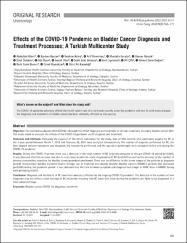| dc.contributor.author | Gürel, Abdullah | |
| dc.contributor.author | Baylan, Burhan | |
| dc.contributor.author | Keles, İbrahim | |
| dc.contributor.author | Erşekerci, Erol | |
| dc.contributor.author | Ekenci, Berk Yasin | |
| dc.contributor.author | Bayraktar, Cemil | |
| dc.contributor.author | Karadağ, Mert Ali | |
| dc.date.accessioned | 2023-03-10T13:45:24Z | |
| dc.date.available | 2023-03-10T13:45:24Z | |
| dc.date.issued | 2022 | en_US |
| dc.identifier.citation | Gürel, A., Baylan, B., Keleş, İ., Demirbaş, A., Karalar, M., Gerçek, O., ... & Karadağ, M. A. (2022). Effects of the COVID-19 Pandemic on Bladder Cancer Diagnosis and Treatment Processes; A Turkish Multicenter Study. | en_US |
| dc.identifier.issn | 2148-9580 | |
| dc.identifier.uri | https://doi.org/10.4274/jus.galenos.2022.2021.0131 | |
| dc.identifier.uri | https://hdl.handle.net/20.500.12513/4962 | |
| dc.description.abstract | Objective: The coronavirus disease-2019 (COVID-19) pandemic effect diagnosis and treatment of certain conditions, including bladder cancer (BC). This study aimed to evaluate the effects of the COVID-19 pandemic on BC diagnosis and treatment.Materials and Methods: Following the approval of the ethics committee for the study, data of 869 patients who underwent surgery for BC in the 2-year period between March 1, 2019 and February 28, 2021 were analyzed retrospectively. The number of surgeries performed for BC, the time elapsed between symptoms and diagnosis, the treatments performed, and the operative pathologies were compared before and during the COVID-19 pandemic.Results: During the COVID-19 period, there was a decrease in the total number of BC surgeries compared to the pre-COVID-19 period (p=0.004). It was observed that this decrease was due to a decrease in patients newly diagnosed with BC (p=0.001) as well as the decrease in the number of primary transurethral resection for bladder tumor procedures performed. There was no difference in the tumor stages of the patients at diagnosis (p=0.9). Intracavitary Bacillus Calmette-Guerin therapy use in high-risk non-muscle invasive bladder cancers (NMIBC) patients also decreased (p=0.008) during the pandemic period. It was observed that the time between symptom and diagnosis was longer in MIBC than in NIMBC during both periods (p<0.001).Conclusion: Diagnosis and treatment of BC have been adversely affected by the ongoing COVID-19 pandemic. The decrease in the number of new diagnoses may not reflect a true decrease in BC incidence, meaning that BC cases that arose during the pandemic are likely to be diagnosed at a more advanced stage. | en_US |
| dc.language.iso | eng | en_US |
| dc.publisher | Galenos Yayıncılık | en_US |
| dc.relation.isversionof | 10.4274/jus.galenos.2022.2021.0131 | en_US |
| dc.rights | info:eu-repo/semantics/openAccess | en_US |
| dc.subject | Bladder cancer | en_US |
| dc.subject | COVID-19 | en_US |
| dc.subject | diagnosis | en_US |
| dc.subject | treatment | en_US |
| dc.title | Effects of the COVID-19 Pandemic on Bladder Cancer Diagnosis and Treatment Processes; A Turkish Multicenter Study | en_US |
| dc.type | article | en_US |
| dc.relation.journal | Journal Of Urologıcal Surgery | en_US |
| dc.contributor.department | Tıp Fakültesi | en_US |
| dc.identifier.volume | 9 | en_US |
| dc.identifier.issue | 3 | en_US |
| dc.identifier.startpage | 165 | en_US |
| dc.identifier.endpage | 171 | en_US |
| dc.relation.publicationcategory | Makale - Uluslararası Hakemli Dergi - Kurum Öğretim Elemanı | en_US |


















